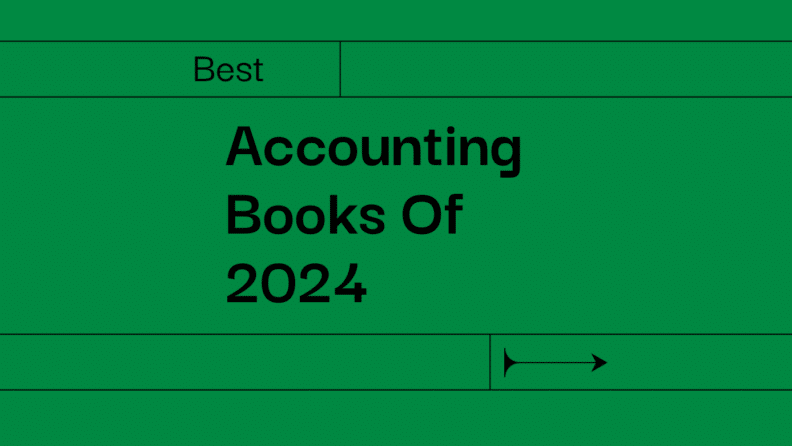On the surface, reading through accounting books can seem as exciting as watching grass grow. However, there is a flip side to it: the more you read, the more you'll understand, and the bigger impact you'll be able to make.
If you want to become the best accounting professional you can, it's time to stop waiting for knowledge to come to you and start seeking it out.
Lucky for you, I've put together a great starting point.
15 Best Books on Accounting
Each book on this carefully curated list of 15 has been chosen for its profound ability to address specific challenges and knowledge gaps in the field of accounting.
Whether you're an accountant already or just looking to learn more about the field, I have something for you.
- Intermediate Accounting by Donald E. Kieso, Jerry J. Weygandt, Terry D. Warfield
- Accounting Made Simple by Mike Piper
- Financial Statements: A Step-by-Step Guide to Understanding and Creating Financial Reports by Thomas Ittelson
- Accounting for Small Business: The Most Complete and Updated Financial Accounting Guide for Small Companies by Martin J. Kallman
- Fundamental Accounting Principles by John Wild
- The Accounting Game by Darrell Mullis, Judith Orloff
- Accounting All-in-One For Dummies by Michael Taillard, Joseph Kraynak (Author), Kenneth W. Boyd (Author)
- How to Read a Financial Report by John A. Tracy and Tage C. Tracy
- Warren Buffett Accounting Book: Reading Financial Statements for Value Investing by Stig Brodersen, Preston Pysh
- The Tax and Legal Playbook: Game-Changing Solutions To Your Small Business Questions by Mark J. Kohler
- A Brief History of Economic Thought by Alessandro Roncaglia
- Accounting QuickStart Guide: The Simplified Beginner's Guide to Financial & Managerial Accounting For Students, Business Owners and Finance Professionals by Josh Bauerle CPA
- Profit First: Transform Your Business from a Cash-Eating Monster to a Money-Making Machine by Mike Michalowicz
- Basics Principles of Accounting: An Ultimate Guide for Beginners to Learn Accounting by Gregory Hill and Doug Greene
- Accounting for Non-Accountants: Financial Accounting Made Simple for Beginners by Wayne Label
Overviews Of The 15 Best Accounting Books
1. Intermediate Accounting by Donald E. Kieso, Jerry J. Weygandt, Terry D. Warfield
Summary:
"Intermediate Accounting" is a vital resource that offers deep insights into financial accounting principles and procedures, providing a framework for understanding and applying International Financial Reporting Standards (IFRS), and showcasing the impact of these standards on Generally Accepted Accounting Principles (GAAP).
What You'll Learn:
Readers will learn detailed insights into financial accounting, apply IFRS, and understand the implications and applications of global financial practices in a business context.
Why You Should Read It:
This book is great for grasping intricate financial accounting concepts and understanding the international standards affecting global business.
About The Author:
Donald E. Kieso, Jerry J. Weygandt, and Terry D. Warfield are acclaimed authors and scholars in the accounting field.
2. Accounting Made Simple by Mike Piper
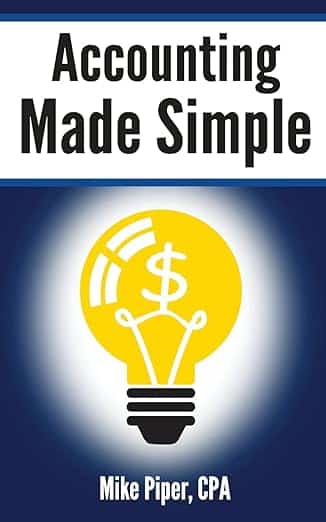
Summary:
In "Accounting Made Simple," Mike Piper breaks down the intricacies of accounting into comprehensible and straightforward accounting terms, offering a concise overview that is apt for beginners, without delving into technical jargon.
What You'll Learn:
The book offers a lucid understanding of basic accounting concepts, preparing and reading financial statements, and interpreting and understanding financial data, all presented in an easy-to-understand manner.
Why You Should Read It:
This book presents a straightforward, non-complex approach to understanding the fundamental principles of accounting.
About The Author:
Mike Piper is a Certified Public Accountant and author, focusing on personal finance books. Follow him on Twitter or explore his website.
3. Financial Statements: A Step-by-Step Guide to Understanding and Creating Financial Reports by Thomas Ittelson
Summary:
"Financial Statements" by Thomas Ittelson is a practical guide, designed to navigate through the creation and understanding of financial reports step by step, ensuring readers can comprehend and craft these crucial documents.
What You'll Learn:
You'll learn to decipher and construct financial statements and identify fraud in financial reports, enabling you to create and comprehend income statements, balance sheets, and cash flow statements with finesse and understanding.
Why You Should Read It:
Learn how to best create and identify key financial documents, as well as gain essential accounting skills in financial management and accountability.
About The Author:
Thomas Ittelson is a respected author with expertise in finance and accounting.
4. Accounting for Small Business: The Most Complete and Updated Financial Accounting Guide for Small Companies by Martin J. Kallman

Summary:
Accounting for Small Business" serves as a comprehensive guide specially crafted for small enterprises. It delivers an in-depth and updated framework of financial accounting, offering a rich variety of methodologies relevant to small companies.
What You'll Learn:
This guide enables readers to gain a thorough understanding of financial accounting, specifically tailored to the nuanced needs and frameworks of small businesses, covering various aspects like managing finances, tax preparations, and ensuring financial compliance within a small business structure.
Why You Should Read It:
Emphasizing practical applications, this book becomes a pivotal resource for small business owners and managers to navigate through the complexities of financial management and bookkeeping without being overwhelmed by excessive jargon and complexities. If you're looking for more small business accounting books, check out my other round-up of the best of that category.
Quote From The Book:
"Effective financial management is the outcome of meticulous accounting."
About The Author:
Martin J. Kallman is an acclaimed financial expert and author, renowned for simplifying intricate accounting concepts for small businesses and providing pragmatic financial guides based on his extensive experience in financial management.
5. Fundamental Accounting Principles by John Wild
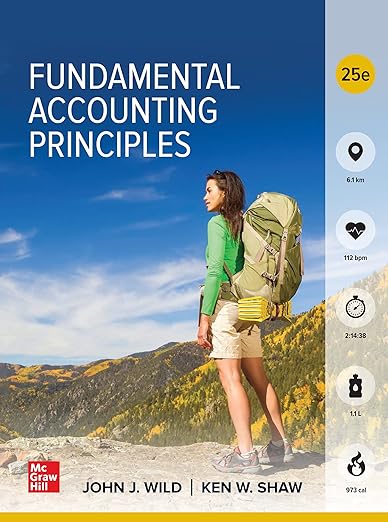
Summary:
John Wild's "Fundamental Accounting Principles" stands as a hallmark in elucidating the essential principles and practices in accounting. It incorporates a balanced mix of comprehensive and understandable content, helping readers to grasp the crux of accounting principles efficiently.
What You'll Learn:
The book guides through the core principles of accounting, exploring vital topics such as financial statements, cost accounting, budgeting, auditing, and various accounting practices and applications, ensuring readers build a solid foundation in accounting.
Why You Should Read It:
For those seeking a structured and accessible guide through the intricacies of accounting principles, John Wild provides a resource that balances depth and accessibility, making it a standout choice for newcomers and seasoned practitioners alike.
Quote From The Book:
"Transparency and accuracy form the bedrock of reliable accounting practices."
About The Author:
John Wild, a highly esteemed professor and co-author of multiple best-selling texts, specializes in illuminating the complexities of financial accounting to students and professionals alike. Connect with John Wild on LinkedIn.
6. The Accounting Game by Darrell Mullis and Judith Orloff
Summary:
"The Accounting Game" by Darrell Mullis and Judith Orloff adopts a refreshing and innovative approach to understanding accounting. By using the analogy of running a lemonade stand to explain fundamental accounting concepts, the book makes accounting accessible and engaging.
What You'll Learn:
Readers will uncover basic accounting concepts such as managing revenue, expenses, assets, and liabilities through the simplified and relatable context of managing a lemonade stand, fostering an intuitive and practical understanding of accounting.
Why You Should Read It:
If you’re seeking a friendly and unconventional approach to grasping the basics of accounting without getting bogged down by technicalities and jargon, this book offers a delightful and educational read.
Quote From The Book:
"Understanding accounting is like piecing together a puzzle, every piece significantly fitting with the other to reveal the complete picture."
About The Author:
Darrell and Judith skillfully navigate through financial concepts, simplifying them into an engaging and accessible format for readers at all levels. Find more from Darrell Mullis on LinkedIn or his website and connect with Judith Orloff on LinkedIn.
7. Accounting All-in-One For Dummies by Michael Taillard, Joseph Kraynak, Kenneth W. Boyd
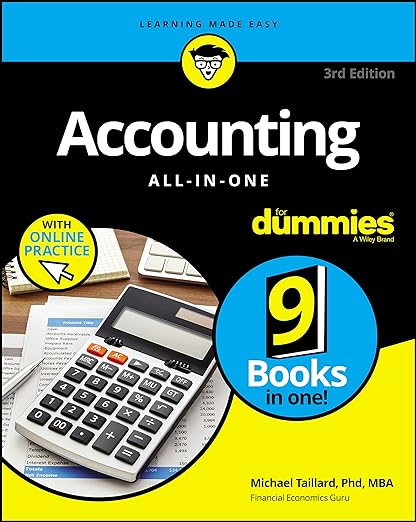
Summary:
"Accounting All-in-One For Dummies" serves as a consolidated resource that envelopes a wide array of accounting topics and concepts, structured to facilitate ease of understanding for readers at different levels of expertise.
What You'll Learn:
Readers will delve into a comprehensive exploration of accounting, exploring diverse topics including accounting procedures, principles, practices, and regulations, all collated into a single, user-friendly resource.
Why You Should Read It:
Given its holistic coverage of numerous accounting aspects, this book is a stellar resource for anyone—accounting students, professionals, or business owners—looking to solidify their understanding of accounting in its entirety.
Quote From The Book:
"Successful accounting is a journey through numbers, where clarity paves the way toward financial stability."
About The Author:
Michael Taillard, Ph.D., is a noted economist and author, recognized for his expertise in financial economics and his ability to distill complex economic and strategic concepts into accessible formats for a wide readership. Learn more about Michael Taillard on LinkedIn.
8. How to Read a Financial Report by John A. Tracy and Tage C. Tracy
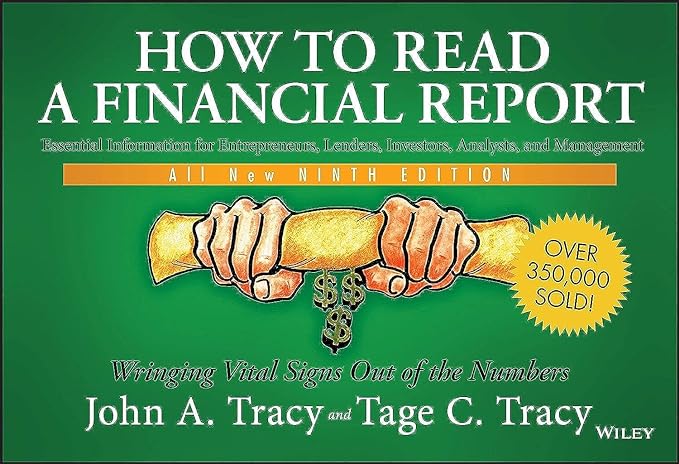
Summary:
John A. Tracy and Tage C. Tracy distill the complexity of financial reports into digestible insights in "How to Read a Financial Report," assisting readers in navigating through the intricacies of financial data with proficiency.
What You'll Learn:
The book disseminates expertise on understanding and interpreting financial reports, providing insights on financial statements, balance sheets, net income statements, and cash flow statements with clear and concise explanations.
Why You Should Read It:
For individuals aspiring to decode the language of financial reports with precision and confidence, this book lays down a clear path, elucidating the critical skills needed to interpret and analyze financial data effectively.
Quote From The Book:
"Unlocking the mysteries of financial reports is akin to developing a keen eye for financial success."
About The Author:
John A. Tracy is a respected accounting expert and author, known for making financial reporting and accounting principles accessible to a broad audience through his widely-read books.
9. Warren Buffett Accounting Book: Reading Financial Statements for Value Investing by Stig Brodersen, Preston Pysh
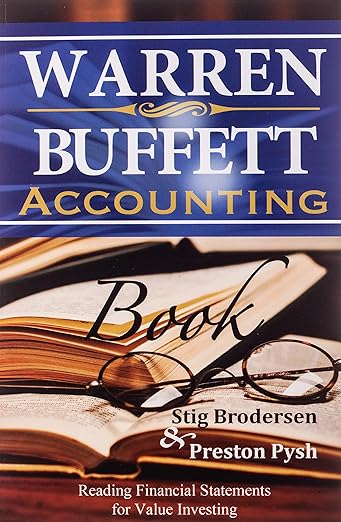
Summary:
"Warren Buffett Accounting Book" offers a profound dive into the world of financial statements and value investing, channeled through the lens of one of the world’s most acclaimed investors, Warren Buffett.
What You'll Learn:
Brodersen and Pysh impart strategies on decoding financial statements and utilizing them for value investing, guided by the wisdom and strategies of Warren Buffett, emphasizing the symbiotic relationship between accounting knowledge and successful investing.
Why You Should Read It:
This book not only introduces readers to the nuances of understanding financial statements but also elucidates how such knowledge can be pivotally applied to strategic investing; reverse engineer this knowledge and you have a winning formula for your company.
Quote From The Book:
"Investing is a financial art that thrives on an accounting canvas."
About The Author:
Stig Brodersen is an investor, author, and co-host of "The Investor's Podcast," widely recognized for demystifying complex investment concepts and sharing insights on value investing through various multimedia platforms. Engage with Stig Brodersen on LinkedIn, Twitter, or visit his podcast.
Preston Pysh is a respected financial analyst, investor, and other half of "The Investor's Podcast". Learn more about Preston Pysh on LinkedIn and Twitter.
10. The Tax and Legal Playbook: Game-Changing Solutions To Your Small Business Questions by Mark J. Kohler
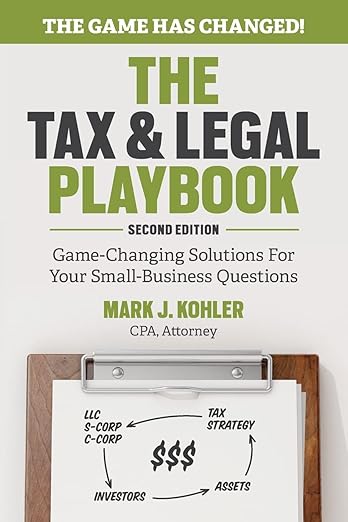
Summary:
Kohler sheds light on pivotal tax and legal strategies tailored for small business owners, offering a playbook to navigate through complex regulatory landscapes and enhance strategic decision-making.
What You'll Learn:
You'll delve into the intricate realms of small business tax and legal strategy, exploring ways to navigate legal challenges and employ tax efficiencies to safeguard and enhance business profitability.
Why You Should Read It:
The book stands out as an invaluable resource for small business owners and entrepreneurs, offering pragmatic solutions to real-world tax and legal challenges, and revealing strategies to optimize business financial health.
Quote From The Book:
"Legal and tax obstacles, though seemingly daunting, can become stepping stones to business success when navigated strategically."
About The Author:
Mark J. Kohler is a CPA, attorney, and best-selling author, renowned for his expert advice in tax planning, legal structures, and wealth management for entrepreneurs and investors. He is accessible on LinkedIn and Twitter.
11. A Brief History of Economic Thought by Alessandro Roncaglia

Summary:
Roncaglia traverses the history of economic thought, dissecting its evolution through varying epochs and spotlighting how theories and philosophers have shaped economic doctrines and policy-making through the ages.
What You'll Learn:
The narrative unfolds the progression of economic thought, guiding readers through the origins, ideologies, and implications of seminal economic theories and how they have been molded by, and molded, their socio-political environments.
Why You Should Read It:
Anyone interested in the evolution of economic theories and their implications will find this book a treasure trove of insights, unraveling the interconnectedness of economic thinking and historical context. Often, these ventures into the past can help us understand the present that much better.
Quote From The Book:
"Economic theories are entwined with their historical moments, reciprocally shaping and being shaped by them."
About The Author:
Alessandro Roncaglia is a renowned Italian economist, celebrated for his writings that navigate through the intricacies of economic theories and history.
12. Accounting QuickStart Guide: The Simplified Beginner's Guide to Financial & Managerial Accounting For Students, Business Owners and Finance Professionals by Josh Bauerle CPA
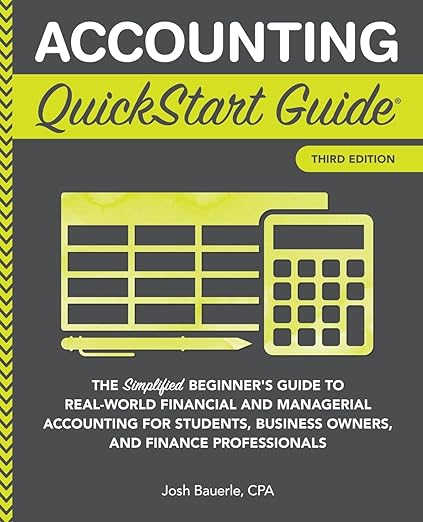
Summary:
Bauerle provides an accessible gateway into the domain of accounting, presenting fundamental concepts of financial and managerial accounting in a simplified and digestible format.
What You'll Learn:
This guide dissects accounting concepts, rendering them accessible and comprehensible for beginners, and providing a sturdy foundational knowledge in financial and managerial accounting.
Why You Should Read It:
Ideal for newcomers, business owners, and students, this guide transforms accounting from a complex subject into an accessible and practical skill, enhancing business accounting, management, and financial mastery.
Quote From The Book:
"Accounting, when decoded, evolves from a business requirement to a potent tool for financial and business management."
About The Author:
Josh Bauerle, CPA, is a prominent financial expert and podcast host, celebrated for making tax planning and business financial strategies accessible and understandable to entrepreneurs through his various platforms.
13. Profit First: Transform Your Business from a Cash-Eating Monster to a Money-Making Machine by Mike Michalowicz
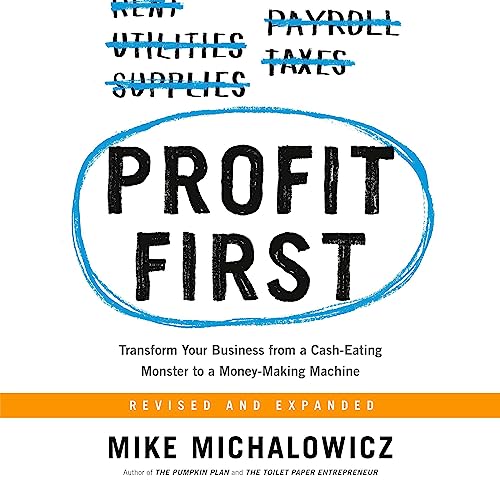
Summary:
Profit First" flips the conventional business cash management paradigm and posits a simple, practical system that helps transform businesses into cash-generating engines. Michalowicz underscores a disciplined approach to ensuring profitability from the get-go.
What You'll Learn:
The book imparts a system where profits are prioritized and accounted for first, before considering expenses. It sets forth a practical and real-life framework for businesses to systematically allocate funds to ensure sustained profitability.
Why You Should Read It:
Entrepreneurs and business owners who find their businesses perpetually strapped for cash despite growing sales will discover a pragmatic accounting system to turn around their cash flow and profitability, ensuring financial health and sustainability.
Quote From The Book:
"The formula, Sales – Expenses = Profit, is not only flawed, it is a myth."
About The Author:
Connect with Mike Michalowicz on LinkedIn, Twitter, or through his website.
14. Basics Principles of Accounting: An Ultimate Guide for Beginners to Learn Accounting by Gregory Hill and Doug Greene
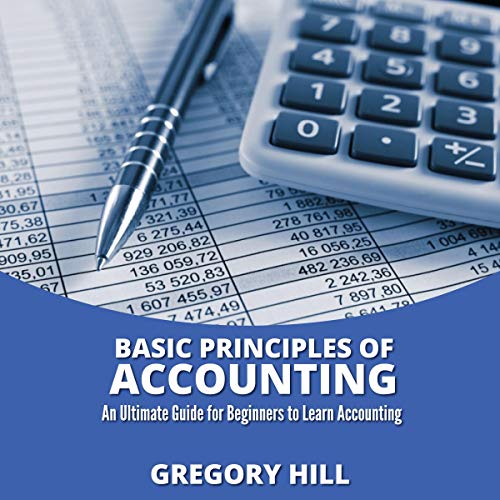
Summary:
"Basics Principles of Accounting" provides a gentle introduction to the fundamental concepts and practices of accounting. Aimed at beginners, it seeks to demystify accounting principles in an accessible and clear manner.
What You'll Learn:
This guide elucidates elementary accounting principles, providing readers with foundational knowledge on topics like financial statements, ledger accounts, balance sheets, and more, all tailored to beginners.
Why You Should Read It:
Anyone looking to gain a foundational understanding of accounting principles, without getting mired in jargon and complexity, will find this book to be a straightforward and valuable guide.
About The Author:
Gregory Hill and Doug Greene are dedicated to simplifying complex accounting concepts for beginners.
15. Accounting for Non-Accountants: Financial Accounting Made Simple for Beginners by Wayne Label
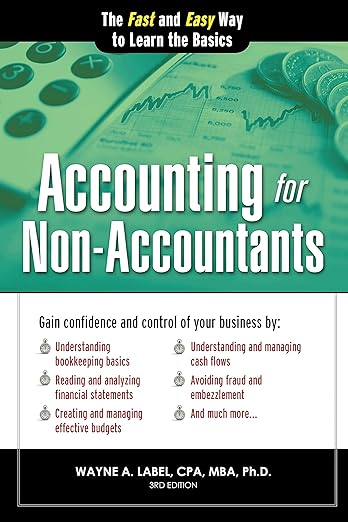
Summary:
Label's "Accounting for Non-Accountants" is an uncomplicated guide designed to navigate non-financial professionals through the essentials of accounting without getting entangled in its complexity.
What You'll Learn:
Readers will learn to decipher and utilize financial statements, understand accounting principles, and apply basic accounting knowledge in making informed business decisions, all without deep-diving into technical depths.
Why You Should Read It:
If you’re a non-finance professional, business owner, or anyone looking to decode the basics of accounting without being overwhelmed by its intricacies, this guide provides a simple and clear pathway.
About The Author:
Engage with Wayne Label on LinkedIn.
Which Accounting Books Do You Recommend?
Feel free to share your thoughts on these books and recommend others that might have been missed on my list in the comments below.
If you're more into essays, and less into novels, for learning, subscribe to The CFO Club's newsletter and get expert insights delivered straight to your inbox every week.

